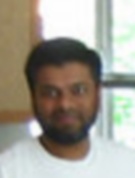by Asim Jalis
My big aha moment with math came when I took Real Analysis which
was a 500 level course, with Jill Wright. What is interesting
about this is that she had also taught me a 200 level advanced
calculus course. I had been bored through the course and wasn't
sure if it was the material or the instructor. But then in the
500 level course it became a completely different game.
As I was sitting through that course I decided that I must major
in math. It was all just too beautiful.
I think the main thing that happened was I understood what
constituted a proof as opposed to just a plausibility argument.
In most undergrad calculus even when they tell you they are
proving something it is really just an argument. It is not a
proof.
The idea that you can actually prove things conclusively, that
there can be no debate about whether the assertion is false or
true, that just blew me away. I think I was more mesmerized by
the structure of proofs and the epistemological implications of
proofs than math itself. But at that point I saw all of it as the
same thing.
I've had the same kind of aha moment in Extreme Programming and
Test-Driven Development. The idea that you can use code to
establish the correctness of other code is quite powerful.
So you are in this system, and the system itself makes statements
about other parts of the system, which prove a kind of internal
consistency.
The chain of logic involved in assertion leading to other
assertions, and the fact that this is even possible, still
surprises me.
The reason this surprises me is that I have always thought of
deduction as a reductive process. You end up with less than what
you started with. Or that it's just a game, and you simply
rearrange what you had initially. In mathematical proofs (and
unit tests) it feels like you can use this deductive process to
create something that was not there originally.
Let me elaborate on this with an example: Arthur Conan Doyle's
Sherlock Holmes. It seems unreal the way Holmes uses deduction to
solve crime, to arrive at facts that were not initially known.
And it seems somehow disconnected from our world. Even proving
simple and universal things like gravity and relativity require
subtle experiments. How is it possible that he can deduce
something as specific as what happened at a particular place at a
particular moment in time using incidental forensic evidence; the
idea that something like this could be deduced so effortlessly
seems unreal.
It feels like while this could be possible in a different
universe, it could not be possible in this one. Mathematics and
unit testing create the perception that in fact this is possible
in our universe.


